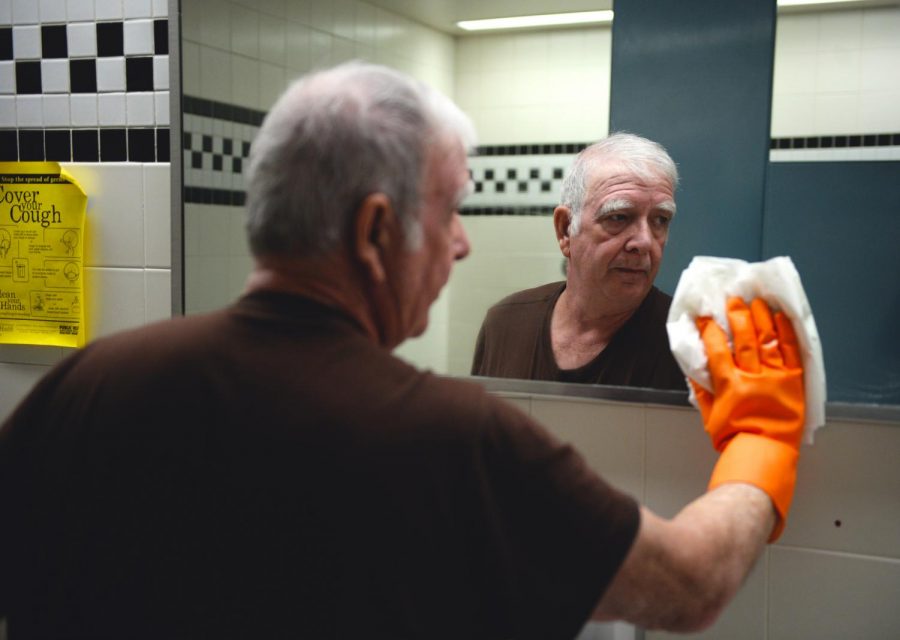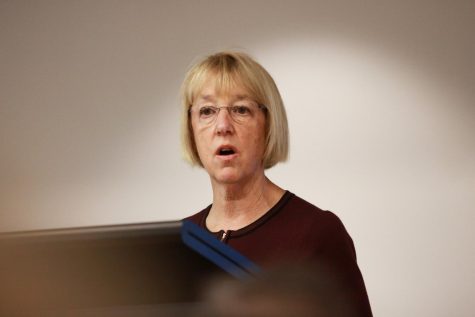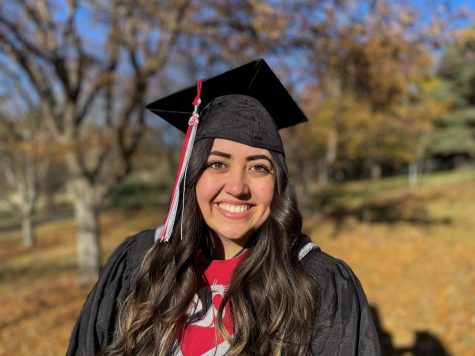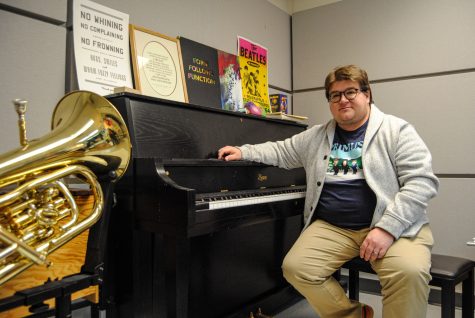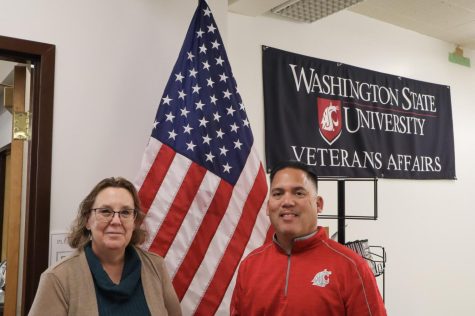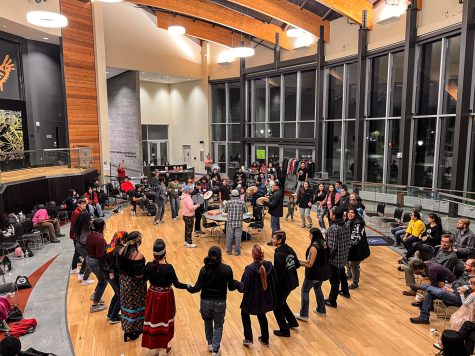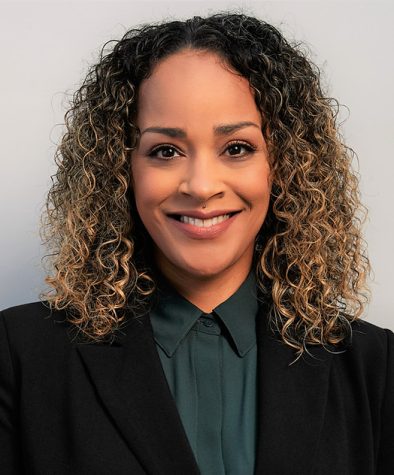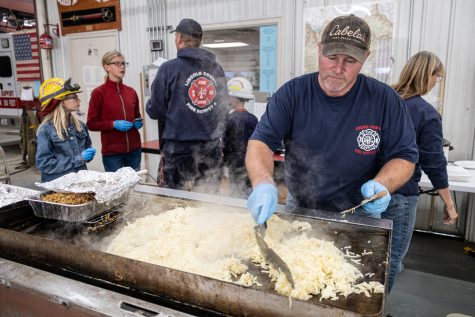Upkeeping with the custodians
Behind the scenes with the unsung backbone of cleanliness at WSU
John Dawson, a custodial lead, wipes the mirror in a Food Quality Building bathroom. Rather than work steadily in one area, Dawson helps wherever needed. “I have a different challenge every day,” he says.
November 30, 2017
John Dawson rolls his cart into a bathroom in the Food Quality Building, keys jingling as he walks, and pulls on neon orange latex gloves.
First he cleans the toilet, next the urinal. Then he moves on to the sinks. He wipes the surface with a white paper towel and holds it out, pointing to an unsettling dark spot.
“See that?” he says. “That’s fecal matter.”
Unsurprisingly, the best custodial anecdotes revolve around poop. Students have been known to write on bathroom walls with their own excrement, or to leave pungent surprises in the middle of the floor. One offender was dubbed the Mad Crapper.
Dawson says he has also found used condoms in classrooms, and even unwittingly walked in on students having sex.
“We clean up everything you can imagine,” he says, “and some things you don’t want to imagine.”
They all have horror stories. But on the average day, the university’s 131 custodians perform the tasks that keep WSU buildings clean, safe and attractive. From sweeping to sanitizing, from buffing to dusting, they are responsible for the upkeep of tens of thousands of square feet each.
Dawson has spent the past 27 years at WSU, mostly as a custodial lead. Rather than work in one area, he helps wherever he’s needed and ensures others are on track. He prefers this, as it gives him a new challenge every day.
“There aren’t many buildings I haven’t worked in,” he says. Today, he’s assisting Jim Nielsen, who has to leave early.
Downstairs, Nielsen cleans the floors of Ferdinand’s Ice Cream Shoppe. Contrary to Dawson, he has worked in the same building for all of his 20-year career at the university. He sometimes gets free cheese, but never ice cream.
His shift begins at 5 a.m., and the place is silent. But throughout the morning, as Ferdinand’s employees and other staff members arrive, he greets them each by name. In the Western Wheat Quality Lab upstairs, his picture hangs beside those of several researchers.
“All my people are really good,” Nielsen says. “I try to keep their area clean, and they try not to make a mess.”
Every three to six months, supervisors walk through to see just how clean the areas are — to check that the floors are properly mopped, the bathrooms thoroughly scrubbed. As Dawson explains the process, called an audit, Nielsen walks past on his way to the custodial closet.
“Jim never has a problem passing his audits,” Dawson says.
“Never,” Nielsen replies with a droll smile.
“I think he bribes them,” Dawson says. “I’m just saying.”
Nielsen laughs. “I said I never get free ice cream. I never said I don’t buy it for other people.”
Part of the reason he has stayed so long in the Food Quality Building is there are no classes, only staff and students who work there. Compared to many buildings, his “clients” are refreshingly considerate.
“This is so much nicer,” he says. “They’re not just coming to class and making a big mess.”
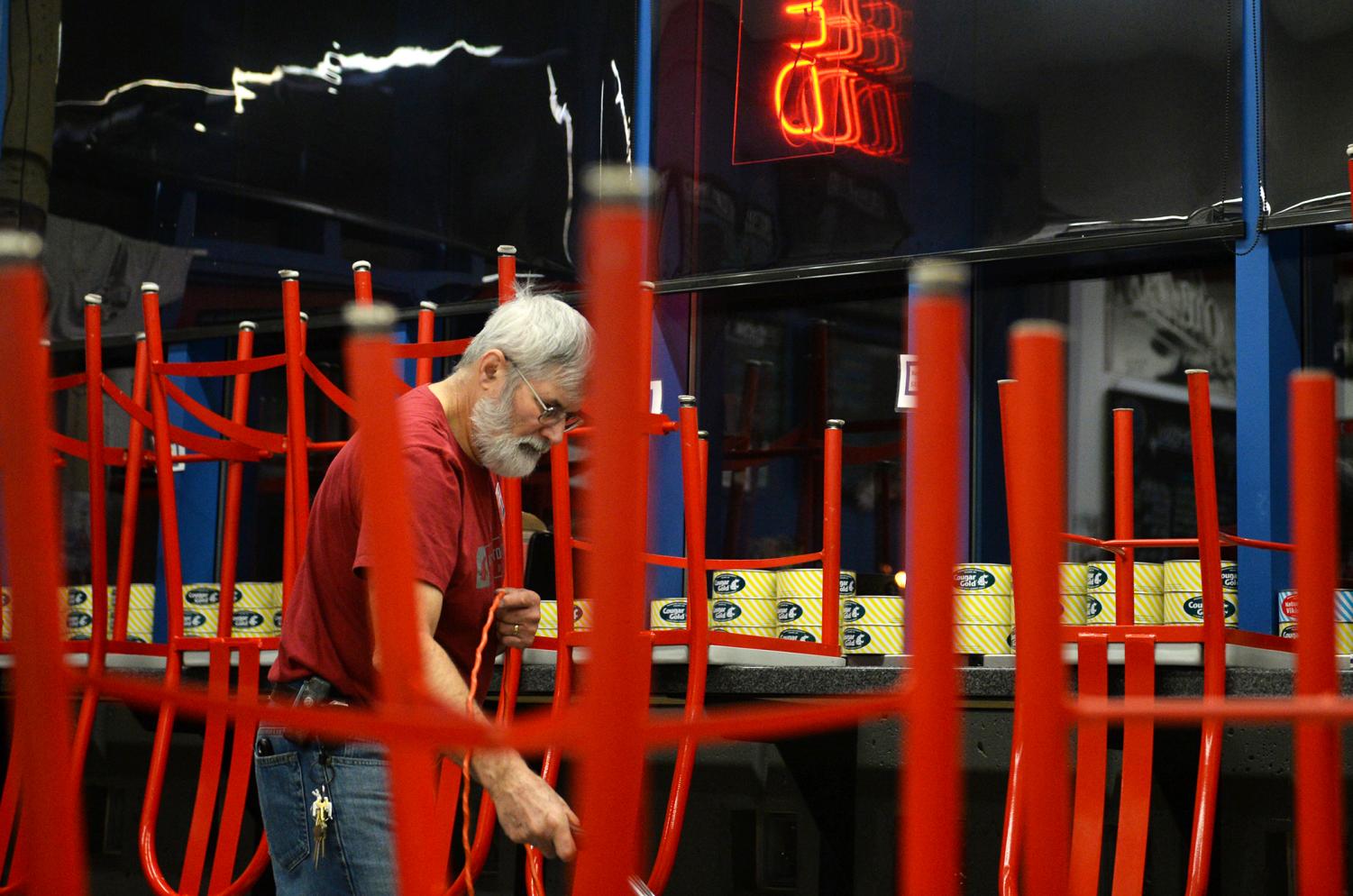
Jim Nielsen, a WSU custodian of 20 years, vacuums the floor of Ferdinand’s Ice Cream Shoppe. He has swept, mopped and scrubbed the same building since he began, and greets everyone there by name. “All my people are really good,” he says. “I try to keep their area clean, and they try not to make a mess.”
The mess makers
There’s no easy way to clean The Pit, and the students who attend class there don’t make it easier. Fulmer 226, a steep auditorium, poses a challenge for custodians who must hike up and down the steps repeatedly each day.
“It would help if they weren’t such slobs,” Christine Persons says as she gathers garbage from among the rows of seats. “I don’t think that people realize the amount of work that goes into being a custodian.”
They come to expect carelessness. Gum scraping and litter pickup are basic aspects of the job, but irritating nonetheless.
“It’s like, do you do this at home?” Persons says. “Their parents would have a cow.”
Despite this, she says she enjoys her work. She has been a custodian for just three years, but spent many more in other areas of WSU. She eventually settled on this job, and “absolutely loves it.” She plans to stick with it until retirement.
Some grow attached to the students, staff and faculty in their areas. Sue Lewis, another custodian in Fulmer Hall, says it’s always bittersweet when the students from the labs she cleans graduate.
“You’re happy for them,” she says, “but you miss them.”
Because he shifts from building to building, Dawson does not know everyone he sees by name. But he meets people constantly, and though he has received rude comments, he says most of his interactions with students are positive. When he explains how their actions affect custodians, they are usually responsive.
“Ninety-nine percent of the people are nice,” he says. “They’re courteous. They don’t look down on us.”
And most custodians respect students equally, Dawson says. They want them to have well-kept facilities. If it isn’t good enough for his family, he says, it isn’t good enough for his clients.
Their job is more than simple cleaning; they are responsible for ensuring the health and safety of the university, as well as its appearance. Yet, Persons says, it is largely a thankless job.
“All these buildings would look like crap if we didn’t have the custodians,” she says.
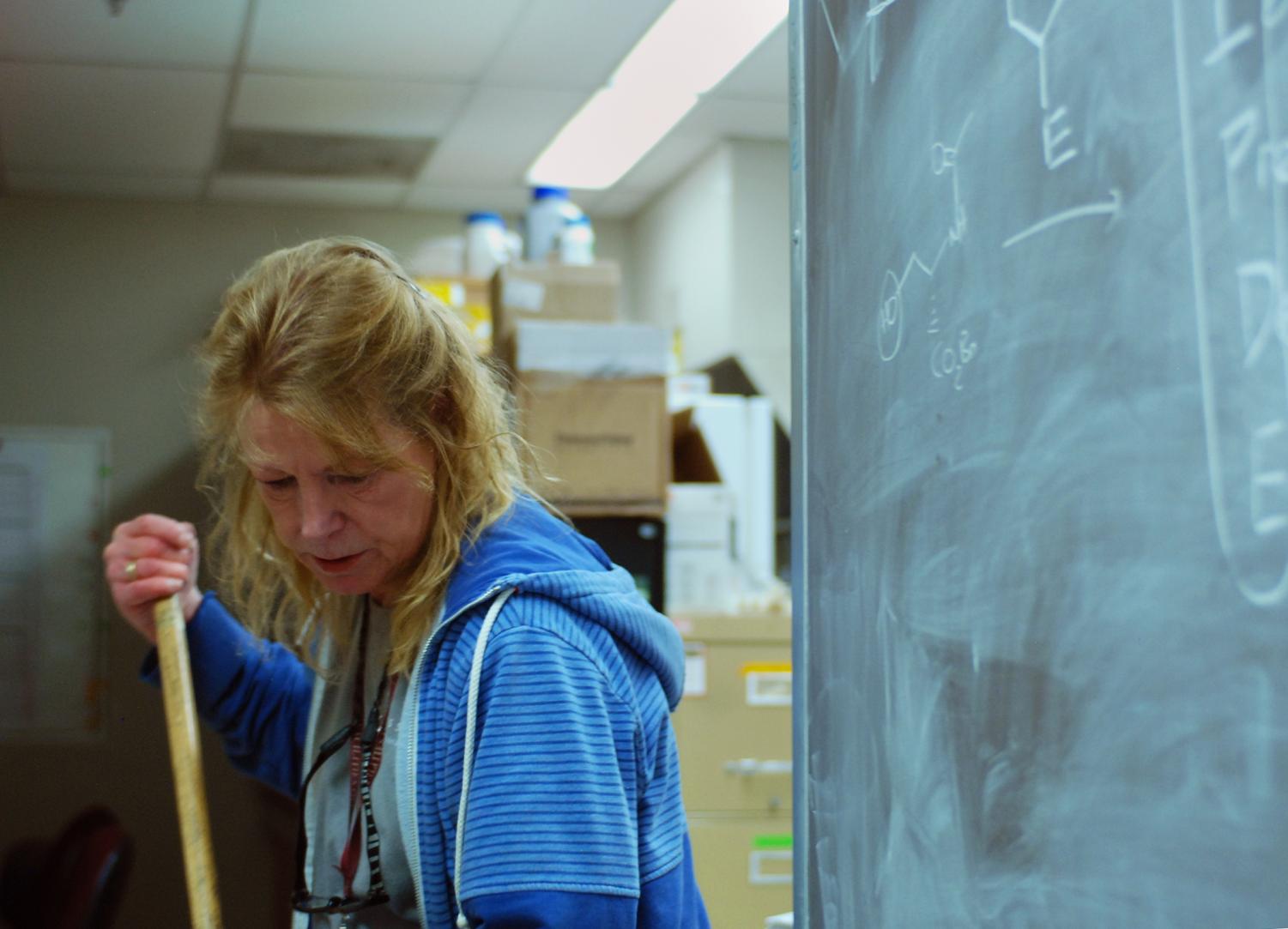
Sue Lewis mops the floor of a lab in Fulmer Hall. Many bear years of chemical stains, and no amount of scrubbing can make the floors appear clean. “Fighting a losing battle,” Lewis says.
A lean but essential team
Since the Great Recession, Custodial Services Director Ben Triplett says, universities have cut back on services. He says WSU has a relatively small staff, compared to other operations he has worked at.
As the university has expanded in recent years, Custodial Services has not. This is not necessarily a problem, Triplett says. But with roughly 60,000 square feet per person, well above the national average of 37,000, they must prioritize their work efficiently. Public areas like bathrooms and classrooms come first, Triplett says.
“Everyone would love to have chocolate on their pillow, maid service when they come to the office,” he says. “But that’s not the funding reality.”
Another problem is recruitment. Amid university spending reductions, he says his top priority is to retain all staff. But most are in entry-level positions, and it can take years to become a competent custodian.
Children dream of being astronauts and firefighters, Triplett says, and it is often difficult to advertise custodial work.
“Most people aren’t gonna see a custodian as an aspirational career,” he says. “But … it can be a fine career.”
For example, he notes that universities offer custodians excellent benefits compared to the private sector. This is what led Dawson to the job.
Though many don’t realize it, Dawson says, a significant number of custodians have college degrees. He earned his in business management, and says he ran two successful businesses before taking up his cleaning supplies.
But he enjoys what he does now as well. “It’s good honest work,” he says. It keeps him healthy and motivated, and he feels like he accomplishes something.
His co-workers usually feel the same, he says. They take pride in a job that is more complex than many imagine. For example, Dawson knows which cleaning solution to use on every surface and why.
He glances at the stall behind him, its porcelain now spotless and shining.
“You say, ‘How do you take pride in a toilet?’” he says. “But it’s just like any job. If you do it well, people are going to appreciate it.”
Most do. But for those who don’t, Dawson says as he rolls his cart out of the newly fresh bathroom, he has the solution.
“I always say, people shouldn’t be allowed to go to college after they graduate high school,” he says. “They should have to be a custodian first.”


